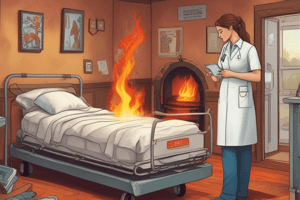Podcast
Questions and Answers
Which type of facility may have anesthetized or restrained patients who are immobile during evacuations?
Which type of facility may have anesthetized or restrained patients who are immobile during evacuations?
- K-12 schools
- Limited care facilities (correct)
- Residential board and care occupancies
- Colleges and universities
What is a major concern in hospitals and nursing homes during evacuations?
What is a major concern in hospitals and nursing homes during evacuations?
- Heavy fuel loads in large open areas
- Sprinkler systems not being effective
- Limited staffing levels
- Patients who may not be able to assist themselves (correct)
What type of occupancy includes hospitals, nursing homes, limited care facilities, and ambulatory health care facilities?
What type of occupancy includes hospitals, nursing homes, limited care facilities, and ambulatory health care facilities?
- Educational
- Residential
- Athletic
- Healthcare (correct)
Which type of facility may have personalized care services for four or more residents?
Which type of facility may have personalized care services for four or more residents?
What is a primary tactic in evacuating healthcare facilities?
What is a primary tactic in evacuating healthcare facilities?
Which type of facility may not have the same level of fire protection as nursing homes and hospitals?
Which type of facility may not have the same level of fire protection as nursing homes and hospitals?
What type of facility may have mentally and/or physically disadvantaged individuals?
What type of facility may have mentally and/or physically disadvantaged individuals?
What is a potential issue with board and care facilities during a fire?
What is a potential issue with board and care facilities during a fire?
Which type of facility may be occupied outside of normal hours for sporting and social events?
Which type of facility may be occupied outside of normal hours for sporting and social events?
What is an important factor in fire protection plans for hospitals?
What is an important factor in fire protection plans for hospitals?
Study Notes
- Fire drills are required in all K-12 schools, but accountability may be less efficient in high schools.
- Schools may be occupied outside of normal hours by teachers, maintenance workers, and administrative personnel, as well as for sporting and social events.
- Colleges and universities have larger campuses and more evening/weekend activities, with classrooms classified as assembly occupancy.
- Healthcare occupancies include hospitals, nursing homes, limited care facilities, and ambulatory health care facilities.
- Mobility is a major concern in hospitals and nursing homes, with many patients nonambulatory and needing assistance to evacuate.
- Ambulatory care facilities may have anesthetized or restrained patients who are immobile.
- Patients in hospitals and nursing homes will look to nurses for direction in an emergency.
- Healthcare facilities use places of safe refuge during evacuations.
- Fire separations and doors are important in hospital fire protection plans.
- Large open areas in hospitals may have heavy fuel loads and oxygen can increase flame intensity and spread.
- Hospitals and nursing homes require special considerations for fire safety and evacuation due to the presence of patients who may not be able to assist themselves.
- Sprinkler systems are effective in limiting the spread of fires in healthcare facilities.
- Limited care facilities may not have the same level of fire protection as nursing homes and hospitals.
- Ambulatory care facilities may require special tactics for patients who are anesthetized or restrained.
- Residential board and care occupancies require personalized care services for four or more residents.
- Staffing levels may be lower in limited care facilities and residential board and care occupancies.
- Multifatality fires have occurred in healthcare facilities in the past, but sprinkler systems have greatly reduced this risk.
- Fire doors can be used to contain fires in healthcare facilities.
- Moving patients to places of safe refuge is a primary tactic in healthcare facility evacuations.
- Many elderly occupants of healthcare facilities may have difficulty using stairs or descending ladders during an evacuation.
- Board and care facilities are residential-style structures that house mentally and/or physically disadvantaged individuals.
- These facilities have limited ability for residents to escape on their own in the event of a fire.
- The fire department should identify and inspect board and care facilities and develop pre-incident plans.
- Most board and care facilities are converted residential buildings with limited egress from upper floors.
- The NFPA has issued fire investigation reports for fires in board and care facilities.
- Notable board and care fires have resulted in multiple fatalities.
- Board and care facilities are a relatively new phenomenon.
- Staff requirements are less in board and care facilities.
- The board and care fire problem is substantial and tactics must be planned in advance.
- Facilities classified as board and care occupancies may have different names, such as group homes, rest homes, shelters, and halfway houses.
Studying That Suits You
Use AI to generate personalized quizzes and flashcards to suit your learning preferences.
Description
This quiz will test your knowledge on fire safety and evacuation tactics specific to various types of occupancies, including K-12 schools, colleges and universities, and healthcare facilities such as hospitals, nursing homes, and ambulatory care facilities. You will also learn about residential board and care occupancies and the unique challenges they present during emergencies. Take this quiz to assess your understanding of fire protection measures and evacuation procedures needed to ensure the safety of occupants in these different types of buildings.




